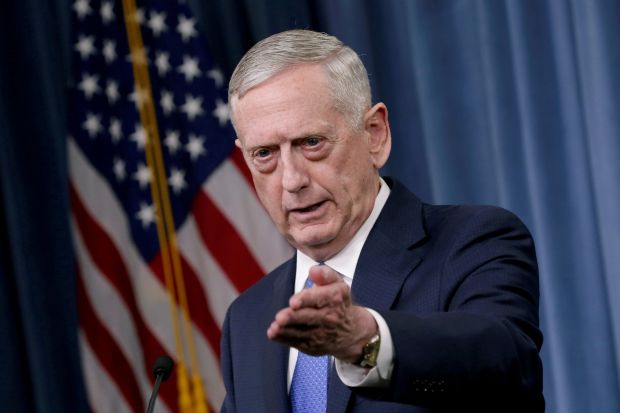US Defense Secretary James Mattis has said any US military role would be conditioned based and would be determined in coordination with the government of the day, once peace was achieved in Afghanistan.
Publish dateWednesday 31 October 2018 - 16:04
Story Code : 173331
“Any US military coalition role after the peace is reached, would be conditions-based, worked out with the Afghan government and depend on the threat,” Mattis told a Washington audience responding to a question at the US Institute of Peace.
The new Special US Envoy in Afghan reconciliation, he said, is working hard on reconciliation, which is the part of the new South Asia Strategy of four R and one S, which is sustain it.
“First R was to regionalize the approach, you did not start with Afghanistan, come up with a strategy, say, "well I guess now we'd better look at the countries around it and see what do we do as far as their inclusion?" We started outside and worked our way inside,” Mattis said.
“Next we recognized we had to put more troops in. But the reason we had to reinforce it, the second R. Was for the third reason, realign those troops to supporting the Afghan security forces, directly by training, advising and assisting,” he said.
“What we had done was is created an army, and then we pulled the training wheels off too early, and in that I mean that only the Afghan special forces had mentors from NATO nations with them. And every time they went against the enemy, the Taliban, they won against the enemy,” he said.
But spread out in penny packets around the country, were Afghan security forces that US had pulled all mentoring away from. “So we were going to look at this as a regional problem, reinforce the troops and realign them so that more Afghan forces had our mentors with them, with NATO air support,” Mattis said.
With NATO air forces overhead, no longer prohibited from supporting the Afghan army would be able to always own the high ground. “And that changes the tactical situation. It is protection of the people is what we are trying to do there so in some cases, we surrendered ground where few if any people lived since it's not a matter of militaries holding ground,” he said.
The Afghan Security Forces, he said, has prevented the Taliban from doing what they said they were going to do, which was to take and hold district and provincial centers, also disrupt an election that they were unable to disrupt.
“But the most important R was the fourth R, reconciliation. And on that, you saw Ambassador Khalilzad has been presented with the portfolio. Those of you who know him, know him as a force of nature,” Mattis said.
“He is hard at work on this, on an Afghan-led, Afghan-owned peace and reconciliation effort. So this is the approach we're trying to sustain right now. It is working from our perspective, but it is heartbreakingly difficult to accept is the progress and violence can be going on at the same time,” said the Defense Secretary.
Source : Afghan Voice Agency(AVA)
avapress.net/vdchxxnzz23nqxd.01t2.html
Tags
Top hits







